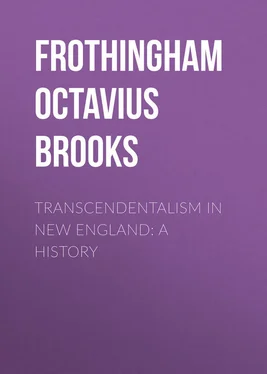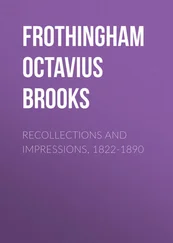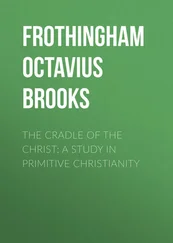Octavius Frothingham - Transcendentalism in New England - A History
Здесь есть возможность читать онлайн «Octavius Frothingham - Transcendentalism in New England - A History» — ознакомительный отрывок электронной книги совершенно бесплатно, а после прочтения отрывка купить полную версию. В некоторых случаях можно слушать аудио, скачать через торрент в формате fb2 и присутствует краткое содержание. Жанр: foreign_antique, foreign_prose, на английском языке. Описание произведения, (предисловие) а так же отзывы посетителей доступны на портале библиотеки ЛибКат.
- Название:Transcendentalism in New England: A History
- Автор:
- Жанр:
- Год:неизвестен
- ISBN:нет данных
- Рейтинг книги:4 / 5. Голосов: 1
-
Избранное:Добавить в избранное
- Отзывы:
-
Ваша оценка:
- 80
- 1
- 2
- 3
- 4
- 5
Transcendentalism in New England: A History: краткое содержание, описание и аннотация
Предлагаем к чтению аннотацию, описание, краткое содержание или предисловие (зависит от того, что написал сам автор книги «Transcendentalism in New England: A History»). Если вы не нашли необходимую информацию о книге — напишите в комментариях, мы постараемся отыскать её.
Transcendentalism in New England: A History — читать онлайн ознакомительный отрывок
Ниже представлен текст книги, разбитый по страницам. Система сохранения места последней прочитанной страницы, позволяет с удобством читать онлайн бесплатно книгу «Transcendentalism in New England: A History», без необходимости каждый раз заново искать на чём Вы остановились. Поставьте закладку, и сможете в любой момент перейти на страницу, на которой закончили чтение.
Интервал:
Закладка:
In May, 1796, – he was then twenty-four years old, – Coleridge wrote to a friend, "I am studying German, and in about six weeks shall be able to read that language with tolerable fluency. Now I have some thoughts of making a proposal to Robinson, the great London bookseller, of translating all the works of Schiller, which would make a portly quarto, on condition that he should pay my journey and my wife's to and from Jena, a cheap German University where Schiller resides, and allow me two guineas each quarto sheet, which would maintain me. If I could realize this scheme, I should there study chemistry and anatomy, and bring over with me all the works of Semler and Michaelis, the German theologians, and of Kant, the great German metaphysician." In September, 1798, in company with Wordsworth and his sister, and at the expense of his munificent friends Josiah and Thomas Wedgewood, he went to Germany and spent fourteen months in hard study. There he attended the lectures of Eichhorn and Blumenbach, made the acquaintance of Tieck, dipped quite deeply into philosophy and general literature, and took by contagion the speculative ideas that filled his imagination with visions of intellectual discovery. Schelling's "Transcendental Idealism," with which Coleridge was afterwards most in sympathy, was not published till 1800. The "Philosophy of Nature" was published in 1797, the year before Coleridge's visit. In 1817, he tells the readers of the "Biographia Literaria" that he had been able to procure only two of Schelling's books – the first volume of his "Philosophical Writings," and the "System of Transcendental Idealism;" these and "a small pamphlet against Fichte, the spirit of which was, to my feelings, painfully incongruous with the principles, and which displayed the love of wisdom rather than the wisdom of love."
The philosophical ideas of Schelling commended themselves at once to Coleridge, who was a born idealist, of audacious genius, speculative, imaginative, original, capable of any such abstract achievement as the German undertook.
"In Schelling's Natur Philosophie and the System des Transcendentalen Idealismus , I first found a genial coincidence with much that I had toiled out for myself, and a powerful assistance in what I had yet to do. All the main and fundamental ideas were born and matured in my mind before I had ever seen a single page of the German philosopher; and I might indeed affirm with truth, before the more important works of Schelling had been written, or at least made public. Nor is this at all to be wondered at. We had studied in the same school; been disciplined by the same preparatory philosophy, namely, the writings of Kant; we had both equal obligations to the polar logic and dynamic philosophy of Giordano Bruno; and Schelling has lately, and, as of recent acquisition, avowed that same affectionate reverence for the labors of Behmen and other mystics which I had formed at a much earlier period. God forbid that I should be suspected of a wish to enter into a rivalry with Schelling for the honors so unequivocally his right, not only as a great original genius, but as the founder of the Philosophy of Nature, and as the most successful improver of the Dynamic system, which, begun by Bruno, was reintroduced (in a more philosophical form, and freed from all its impurities and visionary accompaniments) by Kant, in whom it was the native and necessary growth of his own system. Kant's followers, however, on whom (for the greater part) their master's cloak had fallen, without, or with a very scanty portion of his spirit , had adopted his dynamic ideas, only as a more refined species of mechanics. With exception of one or two fundamental ideas which cannot be withheld from Fichte, to Schelling we owe the completion and the most important victories of this revolution in philosophy. To me it will be happiness and honor enough, should I succeed in rendering the system itself intelligible to my countrymen, and in the application of it to the most awful of subjects for the most important of purposes. Whether a work is the offspring of a man's own spirit and the product of original thinking, will be discovered by those who are its sole legitimate judges, by better tests than the mere reference to dates."
The question of Coleridge's alleged plagiarism from Schelling does not concern us here. Whether the philosophy he taught was the product of his own thinking, or whether he was merely the medium for communicating the system of Schelling to his countrymen, is of no moment to us. For us it is sufficient to know that the English-speaking people on both shores of the Atlantic received them chiefly through the Englishman. Those who are interested in the other matter will find Coleridge's reputation vindicated in a long and elaborate introduction to the "Biographia Literaria," edition of 1847, by the poet's son.
Coleridge was a pure Transcendentalist, of the Schelling school. The transcendental phrases came over and over in book and conversation, "reason" and "understanding," "intuition," "necessary truths," "consciousness," and the rest that were used to describe the supersensual world and the faculties by which it was made visible. He shall speak for himself. The following passage from the "Biographia Literaria," Chapter XII., will be sufficiently intelligible to those who have read the previous chapters, or enough of them to comprehend their cardinal ideas:
"The criterion is this: if a man receives as fundamental facts, and therefore of course indemonstratable and incapable of further analysis, the general notions of matter, spirit, soul, body, action, passiveness, time, space, cause and effect, consciousness, perception, memory and all these, and is satisfied if only he can analyze all other notions into some one or more of these supposed elements, with plausible subordination and apt arrangement; to such a mind I would as courteously as possible convey the hint, that for him this chapter was not written… For philosophy, in its highest sense, as the science of ultimate truths, and therefore scientia scientiarum , this mere analysis of terms is preparative only, though as a preparative discipline indispensable.
"Still less dare a favorable perusal be anticipated from the proselytes of that compendious philosophy which, talking of mind, but thinking of brick and mortar, or other images equally abstracted from body, contrives a theory of spirit by nicknaming matter, and in a few hours can qualify its dullest disciples to explain the omne scibile by reducing all things to impressions, ideas, and sensations.
"But it is time to tell the truth; though it requires some courage to avow it in an age and country in which disquisitions on all subjects not privileged to adopt technical terms or scientific symbols, must be addressed to the public. I say, then, that it is neither possible nor necessary for all men, nor for many, to be philosophers. There is a philosophic consciousness which lies beneath or (as it were) behind the spontaneous consciousness natural to all reflecting beings. As the elder Romans distinguished their northern provinces into Cis-Alpine and Trans-Alpine, so may we divide all the objects of human knowledge into those on this side and those on the other side of the spontaneous consciousness. The latter is exclusively the domain of pure philosophy, which is therefore properly entitled transcendental , in order to discriminate it at once, both from mere reflection and re -presentation on the one hand, and on the other from those flights of lawless speculation which, abandoned by all distinct consciousness, because transgressing the bounds and purposes of our intellectual faculties, are justly condemned as transcendent .
"The first range of hills that encircles the scanty vale of human life is the horizon for the majority of its inhabitants. On its ridges the sun is born and departs. From them the stars rise, and touching them they vanish. By the many, even this range, the natural limit and bulwark of the vale, is but imperfectly known. Its higher ascents are too often hidden in mists and clouds from uncultivated swamps which few have courage or curiosity to penetrate. To the multitude below these vapors appear, now as the dark haunts of terrific agents, on which none may intrude with impunity; and now all aglow, with colors not their own, they are gazed at as the splendid palaces of happiness and power. But in all ages there have been a few who, measuring and sounding the rivers of the vale at the feet of their farthest inaccessible falls, have learned that the sources must be far higher and far inward; a few who, even in the level streams, have detected elements which neither the vale itself nor the surrounding mountains contained or could supply. How and whence to these thoughts, these strong probabilities, the ascertaining vision, the intuitive knowledge may finally supervene, can be learned only by the fact. I might oppose to the question the words with which Plotinus supposes Nature to answer a similar difficulty: 'Should any one interrogate her how she works, if graciously she vouchsafe to listen and speak, she will reply, it behooves thee not to disquiet me with interrogatories, but to understand in silence, even as I am silent, and work without words.'
Читать дальшеИнтервал:
Закладка:
Похожие книги на «Transcendentalism in New England: A History»
Представляем Вашему вниманию похожие книги на «Transcendentalism in New England: A History» списком для выбора. Мы отобрали схожую по названию и смыслу литературу в надежде предоставить читателям больше вариантов отыскать новые, интересные, ещё непрочитанные произведения.
Обсуждение, отзывы о книге «Transcendentalism in New England: A History» и просто собственные мнения читателей. Оставьте ваши комментарии, напишите, что Вы думаете о произведении, его смысле или главных героях. Укажите что конкретно понравилось, а что нет, и почему Вы так считаете.












